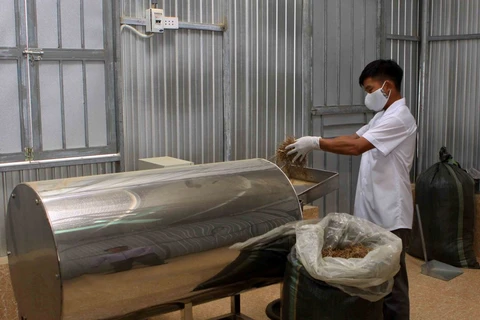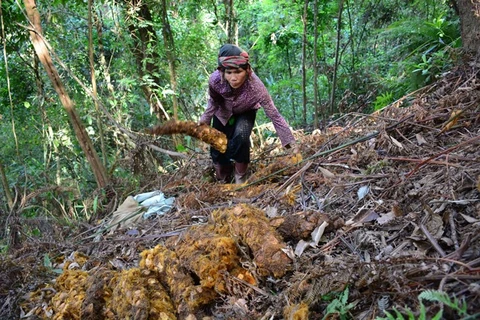Hanoi (VNS/VNA) - The herbal medicine industry remained largely untapped despite Vietnam’s many favourable conditions, said industry experts and policymakers.
According to Prof Pham Vu Khanh, former head of the traditional medicine department under the Ministry of Health, close to a third of all flora in the country or 4,000 plant species could be used for medicine yet the country still had to import as much as 50,000 tonnes of medicinal herbs every year (80-85 per cent of medicinal herbs used).
For example, 300-400 tonnes of herbs were imported through the Chi Ma International Border Gate in the northern province of Lang Son alone. Imported herbs typically fell under two categories: natural-grown and agriculture-cultivated with the majority being the latter.
Cultivated herbs were often affordable but varying in quality and in many instances, neither safe nor suitable for use in medicine production.
Dr Phan Thuy Hien, deputy head of the National Institute of Medical Substances, said the underlying causes of Vietnamese medicinal herbs losing on home turf were lack of economies of scale, poor transport infrastructure and labour-intensive production methods, which all contributed to high prices compared to competitors.
Except for a handful number of cooperatives that have successfully implemented working production models, the vast majority of production centres were small in size and lack both the ability and the will to employ rigid quality control. Furthermore, it's often difficult for local communities to connect with pharmaceutical companies and vice versa.
The Red River Delta traditionally has been a major production centre of medicinal herbs with the Central Highlands in recent years catching up quickly thanks to its suitable soil and experienced farmers.
According to Prof Le Van Truyen, a former health deputy minister, there was a long documented history of traditional medicine in the country. Along with modern medicine, herbal medicine has been playing an important part in the health sector.
Herbal medicine also serves another purpose which is bolstering patients' health foundation on top of providing key nutrients, according to Prof Tran Van On, head of the flora study department of the Hanoi University of Pharmacy.
On said it required a concrete and well-coordinated effort by multiple ministries and agencies to help develop the industry.
"We have many policies and lofty objectives yet too few protocols for real studies and practices," he said.
"Even now we still do not have an official long-term development plan for the industry," he added.
On said it's difficult to produce medicinal herbs, even those that are native and strong in Vietnam if the country continued to rely on imports.
He urged the central government to start the establishment of a supply chain and the implementation of support policies for domestic-grown products. In addition, the Ministry of Health must step up efforts to filter out low-quality herbs and those of dubious origin and invest more in upgrades to traditional medicine centres across the country./.
According to Prof Pham Vu Khanh, former head of the traditional medicine department under the Ministry of Health, close to a third of all flora in the country or 4,000 plant species could be used for medicine yet the country still had to import as much as 50,000 tonnes of medicinal herbs every year (80-85 per cent of medicinal herbs used).
For example, 300-400 tonnes of herbs were imported through the Chi Ma International Border Gate in the northern province of Lang Son alone. Imported herbs typically fell under two categories: natural-grown and agriculture-cultivated with the majority being the latter.
Cultivated herbs were often affordable but varying in quality and in many instances, neither safe nor suitable for use in medicine production.
Dr Phan Thuy Hien, deputy head of the National Institute of Medical Substances, said the underlying causes of Vietnamese medicinal herbs losing on home turf were lack of economies of scale, poor transport infrastructure and labour-intensive production methods, which all contributed to high prices compared to competitors.
Except for a handful number of cooperatives that have successfully implemented working production models, the vast majority of production centres were small in size and lack both the ability and the will to employ rigid quality control. Furthermore, it's often difficult for local communities to connect with pharmaceutical companies and vice versa.
The Red River Delta traditionally has been a major production centre of medicinal herbs with the Central Highlands in recent years catching up quickly thanks to its suitable soil and experienced farmers.
According to Prof Le Van Truyen, a former health deputy minister, there was a long documented history of traditional medicine in the country. Along with modern medicine, herbal medicine has been playing an important part in the health sector.
Herbal medicine also serves another purpose which is bolstering patients' health foundation on top of providing key nutrients, according to Prof Tran Van On, head of the flora study department of the Hanoi University of Pharmacy.
On said it required a concrete and well-coordinated effort by multiple ministries and agencies to help develop the industry.
"We have many policies and lofty objectives yet too few protocols for real studies and practices," he said.
"Even now we still do not have an official long-term development plan for the industry," he added.
On said it's difficult to produce medicinal herbs, even those that are native and strong in Vietnam if the country continued to rely on imports.
He urged the central government to start the establishment of a supply chain and the implementation of support policies for domestic-grown products. In addition, the Ministry of Health must step up efforts to filter out low-quality herbs and those of dubious origin and invest more in upgrades to traditional medicine centres across the country./.
VNA
























